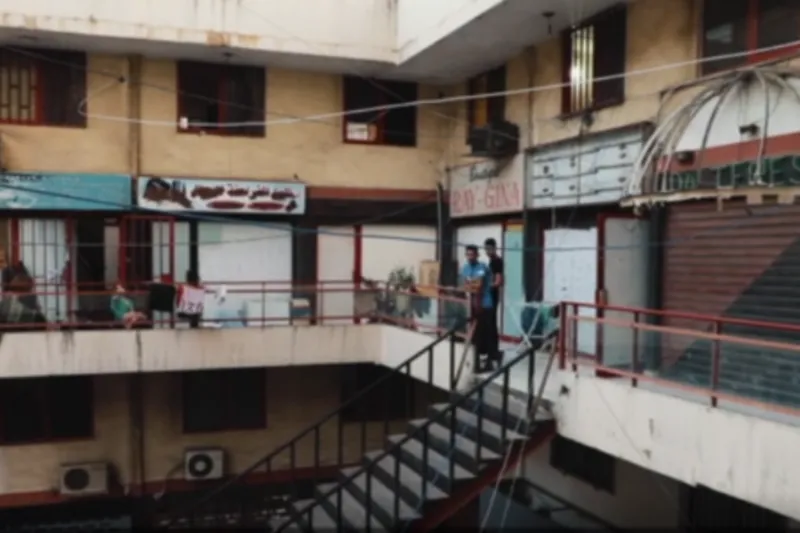
Rome Newsroom, Jul 9, 2021 / 14:00 pm (CNA).
In an abandoned mall on the outskirts of Beirut, an image of St. Thérèse of Lisieux hangs in the window of what was once a storefront. This former clothing store now serves as home for Christian refugees who have been hit hard by the inflation caused by Lebanon’s severe economic depression.
The living conditions for the refugees who were forced to move to the abandoned mall were documented on video by A Demand for Action, a Sweden-based NGO that aids minorities in the Middle East.
“I came from Iraq in 2017 when ISIS invaded Iraq,” a man living in one of the former stores said in the video.
“We suffered from persecution against Christians, from terrorism, and kidnapping perpetrated by the militias, as well as the rape of Christian girls — or any girl who did not wear a veil or was wearing a cross. I was overwhelmed by fear and the great threat to my family and children, so I was forced to flee to Lebanon.”
He showed the nearly windowless room with sparse walls, except for some holy cards with images of the Virgin Mary, and peeling paint from the ceilings.
“The place where I live now was previously a clothing store. There were no bathrooms or kitchen before; we tried as much as possible to make some modifications to be able to live in this shop.”
Another refugee explained: “Because of the economic crisis and the difficult conditions that Lebanon suffers from, we as refugees, were forced to live in these shops because of the high rents of regular homes.”
Lebanon’s currency has plummeted in 2021. By June, the Lebanese pound had lost 90% of its value since October 2019.
The World Bank has described the current financial situation in Lebanon as among the “most severe crisis episodes globally since the mid-19th century.”
It estimates that Lebanon’s real GDP contracted by more than 20% in 2020, with surging inflation, high unemployment, and more than half of the population below the national poverty line.
Lebanon also hosts the largest number of refugees per capita in the world, according to the U.N. The country took in 1.5 million Syrians, nearly half of which are not registered with legal status.
Nuri Kino, the founder of A Demand for Action, described the economic situation in Lebanon as “severe.”
“The average salary in Lebanon was about $500 just two years ago. Today, those who earned that much are forced to accept $50 a month in salary,” Kino wrote July 8.
“Meanwhile, food and gas prices have gone up, not down. The situation is unsustainable. And refugees from the surrounding countries are among the most vulnerable,” he said.
Lebanon’s leaders have failed to form a government to implement reforms after the devastating explosion in Beirut’s port on Aug. 4. The blast killed nearly 200 people, injured 600 others, and caused more than $4 billion in damage.
Hassan Diab, who resigned as prime minister in the wake of the blast, said in a speech to ambassadors in Beirut on July 7 that “Lebanon is a few days away from social explosion.”
“The Lebanese are facing this dark fate alone,” he said.
Pope Francis hosted a day of prayer for Lebanon on July 1 which brought Catholic and Orthodox leaders to the Vatican to discuss the crisis facing the country.
“We assembled today to pray and reflect, impelled by our deep concern for Lebanon — a country very close to my heart and which I wish to visit — as we see it plunged into a serious crisis,” the pope said.
“In these woeful times, we want to affirm with all our strength that Lebanon is, and must remain, a project of peace. Its vocation is to be a land of tolerance and pluralism, an oasis of fraternity where different religions and confessions meet, where different communities live together, putting the common good before their individual interests,” Pope Francis said.
The Vatican’s Secretary for Relations with States confirmed on July 7 that the pope has “made a commitment to visit Lebanon.”
“He has also said that he will visit Lebanon when there is a government. So that’s a great stimulus to form a government,” Archbishop Paul Gallagher said.
“We’re trying to do small steps, move forward, see what the reaction is. But we are appealing at the same time to the international community to do everything in its power to help Lebanon at this critical time,” he said.
If you value the news and views Catholic World Report provides, please consider donating to support our efforts. Your contribution will help us continue to make CWR available to all readers worldwide for free, without a subscription. Thank you for your generosity!
Click here for more information on donating to CWR. Click here to sign up for our newsletter.





Leave a Reply